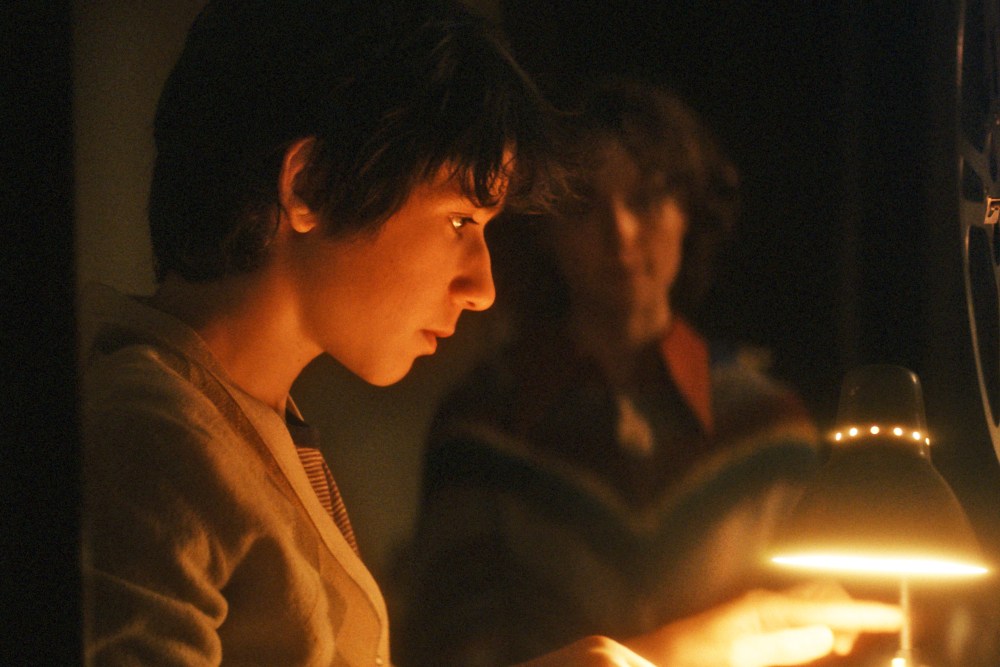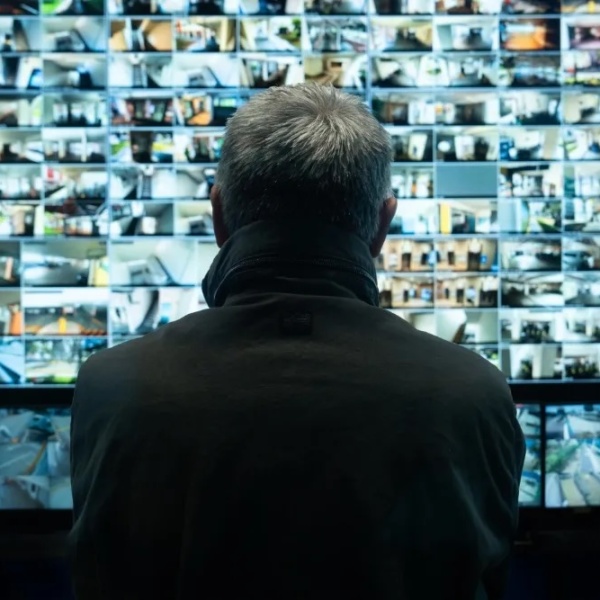Directors have been filming “love letters to cinema” ever since they first exhibited nostalgia for the medium (or their own burgeoning cinephilia). Arnaud Desplechin’s new hybrid essay film “Filmlovers!” waxes poetic about cinema’s capacity to entrance, but he doesn’t coast on cozy remembrance. Instead, he balances nostalgia with scholarly analysis and a tactile focus. The post-New Wave French filmmaker acutely understands that cinephilia is both an intellectual and sensorial experience; the feeling of the a theater seat and the flicker of a projector hold as much weight as deploying different frameworks to unpack symbolism or allusions. “Filmlovers!” melds fiction and non-fiction, the personal and the political, popular and art cinema, into a lyrical tribute to spectatorship, embracing all the theories and emotions that come with it.
Via narration by long-time collaborator Mathieu Amalric, Desplechin begins with a meditation on cinema’s artistic forebearers (painting, photography, puppetry, etc.) and its intrinsic properties, mainly time and movement. Throughout “Filmlovers!,” he repeatedly circles back to cinema’s historical development, from the early days of projection in the late 19th century through its industry expansion, the rise of television, and eventually its contemporary moment.
Before invoking theory or personal emotions, “Filmlovers!” grounds the medium in its material realities, conveying to an audience — albeit one who probably already knows this stuff — that film is intrinsically tied to technology, economics, and a country’s sociopolitical fabric.
Structured in chapters, “Filmlovers!” deploys multiple film excerpts across cinema history to supplement analyses of spectatorship, specifically the ways movies comment upon the gaze of the viewer. Most of the time, Desplechin uses clips as quotations, using a torrent of imagery to emphasize a particular point, but sometimes Desplechin-via-Amalric will comment at length about a particular film or engage with granular scene analysis.
Desplechin embodies a true cinephile’s expansive love of film. Scenes from “Terminator 2: Judgement Day” and “Persona” are given equal weight. Desplechin will dive deep into D.W. Griffith while also incorporating a lengthy examination of a scene from “Notting Hill” as a metaphor for cinema itself, expound upon ideas he’s publicly expressed before.
Desplechin also revives his loose fictional avatar Paul Dedalus for “Filmlovers!” to lend the film a personal edge. A Nathan Zuckerman-like figure, Paul Dedalus sports a flexible persona that allows the filmmaker to explore various pet ideas unbound by continuity. In Desplechin’s 1996 international breakthrough “My Sex Life… or How I Got into an Argument,” the existentially adrift Paul (Amalric) was a philosophy PhD student struggling to complete his dissertation amidst a complicated love life. The 2015 sorta-prequel “My Golden Days” features Paul, played by Amalric as an adult (also played by Amalric) living in Paris and Quentin Dolmaire as a young man in Roubaix, as an anthropologist who routinely does field work in Asia. But in “Filmlovers!,” Desplechin presents Paul as an avowed cinephile from a young age, featuring him in three phases: a curious child, a film-obsessed teen, and a suave twenty-something scholar.
The Dedalus scenes bring out a tenderness in Desplechin, if only because it provides him the chance to remix and fictionally explore memories from his own life. Paul’s love of cinema, like Desplechin’s, emerges from the time his grandmother, played in “Filmlovers!” by the legendary Françoise Lebrun, took him and his sister to see “Fantômas” in the cinema. He recreates this story on screen by emphasizing the utter mundanity of the setting and experience — Paul goes to the bathroom alone at one point, they leave early because Paul’s sister becomes frightened by Jean Marais’ performance — but within that normalcy, a lifelong fascination begins to blossom. “Filmlovers!” pays tribute to the ways that elders can shepherd and influence their charges’ love of art just by allowing them to experience it on their own.
As Paul grows up, his obsession becomes more of an active pursuit. He sneaks into a repertory screening of “Cries and Whispers” and it changes his life. He programs “Daisies” for his own high school film club where he impresses a girl with his earnest introduction and careful monitoring of the projection. For Paul (and, presumably, Desplechin), cinephilia and amorous desire are forever intertwined.
The best sequence in “Filmlovers!” involves Paul in his twenties engaging with two women — his crush who’s involved with someone else and her more outgoing friend — at a screening of Francis Ford Coppola’s “Peggy Sue Got Married.” While Desplechin definitely filters the scene through a romantic’s trapped-in-amber glow, he also neatly captures how cinema-going and romance can become wrapped up in a shared gaze, and how sharing a passion can become a flirtatious game on its own.
Though Paul Dedalus recurs throughout “Filmlovers!,” his scenes aren’t so much part of a narrative throughline as an example of one spectator amongst many. Desplechin includes other fictional scenes to illustrate different ideas of spectatorship, like a meeting between philosopher Sandra Laugier and a graduate student about the nature of film realism through different theoretical lenses. (How often do the movies depict an extended discussion of the ontology of film by way of Stanley Cavell and Andre Bazin?)
He also features a sequence of documentary-style testimonials from anonymous individuals who discuss their cinematic routines (where they sit in the theater, what they eat) as well as their most cherished film memories. One man talks about how seeing Maurice Pialat’s “A Nos Amours” changed his life; a little girl explains how she was emotionally affected by Steven Spielberg’s “West Side Story” adaptation.
“Filmlovers!” freely digresses through multiple different cinematic modes, consciously mirroring Desplechin’s aggressive cinematic style in his narrative work. Its episodic nature inevitably means certain sequences will endear themselves to different viewers, but Desplechin still offers multiple points of entry. Though the Dedalus sections will likely be cherished more by those who have followed the character for years, they certainly compel on their own merits and require no prior context. Similarly, the more academic scenes might intrigue viewers who have dipped their toes in film theory or cinema studies, but they’re never so dry to alienate anyone unfamiliar with the material. Anytime ideas drift towards abstraction, “Filmlovers!” returns to the physical and emotional sensations that film inspires.
For better or worse, Desplechin’s palpable passion for cinema is the main selling point of “Filmlovers!” So much of it feels like an opportunity for the director to filmically expunge ideas and memories he’s held onto for a while, like a lengthy tribute to Claude Lanzmann’s “Shoah” or a shot-by-shot analysis of the opening to “The 400 Blows” filtered through the perspective of a fictional aspiring director.
Desplechin freely risks boring or annoying anyone well-versed in his talking points — which, if we’re being honest, might be a sizable portion of the film’s actual audience — and he seems predictably, refreshingly indifferent to any charges of pretension. While “Filmlovers!” might not say anything new about the theatrical experience or the history of cinema, it might linger, however briefly, in your mind as a warm memory, and that’s certainly Desplechin’s chief intention.
Grade: B
“Filmlovers!” premiered at the 2024 Cannes Film Festival. It is currently seeking U.S. distribution.






